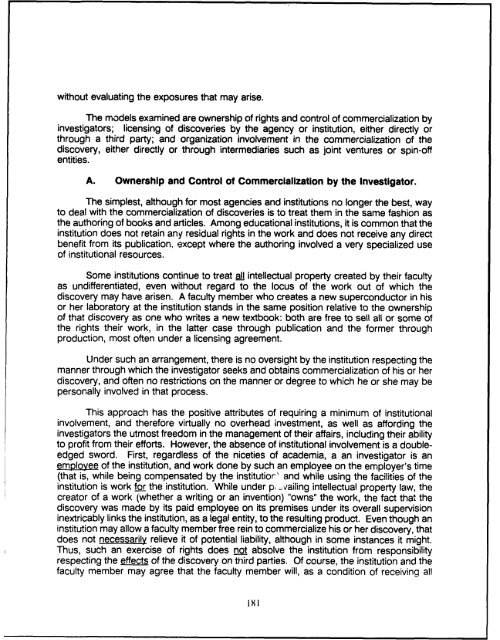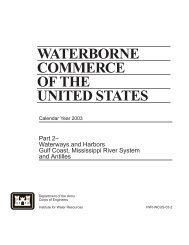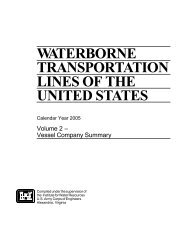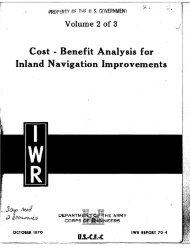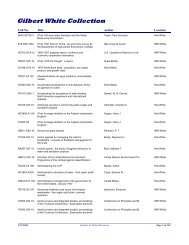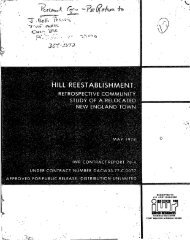Challenges and Opportunities for Innovation in the Public Works ...
Challenges and Opportunities for Innovation in the Public Works ...
Challenges and Opportunities for Innovation in the Public Works ...
You also want an ePaper? Increase the reach of your titles
YUMPU automatically turns print PDFs into web optimized ePapers that Google loves.
without evaluat<strong>in</strong>g <strong>the</strong> exposures that may arise.<br />
The models exam<strong>in</strong>ed are ownership of rights <strong>and</strong> control of commercialization by<br />
<strong>in</strong>vestigators; licens<strong>in</strong>g of discoveries by <strong>the</strong> agency or <strong>in</strong>stitution, ei<strong>the</strong>r directly or<br />
through a third party; <strong>and</strong> organization <strong>in</strong>volvement <strong>in</strong> <strong>the</strong> commercialization of <strong>the</strong><br />
discovery, ei<strong>the</strong>r directly or through <strong>in</strong>termediaries such as jo<strong>in</strong>t ventures or sp<strong>in</strong>-off<br />
entities.<br />
A. Ownership <strong>and</strong> Control of Commercialization by <strong>the</strong> Investigator.<br />
The simplest, although <strong>for</strong> most agencies <strong>and</strong> <strong>in</strong>stitutions no longer <strong>the</strong> best, way<br />
to deal with <strong>the</strong> commercialization of discoveries is to treat <strong>the</strong>m <strong>in</strong> <strong>the</strong> same fashion as<br />
<strong>the</strong> author<strong>in</strong>g of books <strong>and</strong> articles. Among educational <strong>in</strong>stitutions, it is common that <strong>the</strong><br />
<strong>in</strong>stitution does not reta<strong>in</strong> any residual rights <strong>in</strong> <strong>the</strong> work <strong>and</strong> does not receive any direct<br />
benefit from its publication, except where <strong>the</strong> author<strong>in</strong>g <strong>in</strong>volved a very specialized use<br />
of <strong>in</strong>stitutional resources.<br />
Some <strong>in</strong>stitutions cont<strong>in</strong>ue to treat all <strong>in</strong>tellectual property created by <strong>the</strong>ir faculty<br />
as undifferentiated, even without regard to <strong>the</strong> locus of <strong>the</strong> work out of which <strong>the</strong><br />
discovery may have arisen. A faculty member who creates a new superconductor <strong>in</strong> his<br />
or her laboratory at <strong>the</strong> <strong>in</strong>stitution st<strong>and</strong>s <strong>in</strong> <strong>the</strong> same position relative to <strong>the</strong> ownership<br />
of that discovery as one who writes a new textbook: both are free to sell all or some of<br />
<strong>the</strong> rights <strong>the</strong>ir work, <strong>in</strong> <strong>the</strong> latter case through publication <strong>and</strong> <strong>the</strong> <strong>for</strong>mer through<br />
production, most often under a licens<strong>in</strong>g agreement.<br />
Under such an arrangement, <strong>the</strong>re is no oversight by <strong>the</strong> <strong>in</strong>stitution respect<strong>in</strong>g <strong>the</strong><br />
manner through which <strong>the</strong> <strong>in</strong>vestigator seeks <strong>and</strong> obta<strong>in</strong>s commercialization of his or her<br />
discovery, <strong>and</strong> often no restrictions on <strong>the</strong> manner or degree to which he or she may be<br />
personally <strong>in</strong>volved <strong>in</strong> that process.<br />
This approach has <strong>the</strong> positive attributes of requir<strong>in</strong>g a m<strong>in</strong>imum of <strong>in</strong>stitutional<br />
<strong>in</strong>volvement, <strong>and</strong> <strong>the</strong>re<strong>for</strong>e virtually no overhead <strong>in</strong>vestment, as well as af<strong>for</strong>d<strong>in</strong>g <strong>the</strong><br />
<strong>in</strong>vestigators <strong>the</strong> utmost freedom <strong>in</strong> <strong>the</strong> management of <strong>the</strong>ir affairs, <strong>in</strong>clud<strong>in</strong>g <strong>the</strong>ir ability<br />
to profit from <strong>the</strong>ir ef<strong>for</strong>ts. However, <strong>the</strong> absence of <strong>in</strong>stitutional <strong>in</strong>volvement is a doubleedged<br />
sword. First, regardless of <strong>the</strong> niceties of academia, a an <strong>in</strong>vestigator is an<br />
employee of <strong>the</strong> <strong>in</strong>stitution, <strong>and</strong> work done by such an employee on <strong>the</strong> employer's time<br />
(that is, while be<strong>in</strong>g compensated by <strong>the</strong> <strong>in</strong>stitutior' <strong>and</strong> while us<strong>in</strong>g <strong>the</strong> facilities of <strong>the</strong><br />
<strong>in</strong>stitution is work <strong>for</strong> <strong>the</strong> <strong>in</strong>stitution. While under pi -vail<strong>in</strong>g <strong>in</strong>tellectual property law, <strong>the</strong><br />
creator of a work (whe<strong>the</strong>r a writ<strong>in</strong>g or an <strong>in</strong>vention) "owns" <strong>the</strong> work, <strong>the</strong> fact that <strong>the</strong><br />
discovery was made by its paid employee on its premises under its overall supervision<br />
<strong>in</strong>extricably l<strong>in</strong>ks <strong>the</strong> <strong>in</strong>stitution, as a legal entity, to <strong>the</strong> result<strong>in</strong>g product. Even though an<br />
<strong>in</strong>stitution may allow a faculty member free re<strong>in</strong> to commercialize his or her discovery, that<br />
does not necessarily relieve it of potential liability, although <strong>in</strong> some <strong>in</strong>stances it might.<br />
Thus, such an exercise of rights does not absolve <strong>the</strong> <strong>in</strong>stitution from responsibility<br />
respect<strong>in</strong>g <strong>the</strong> effects of <strong>the</strong> discovery on third parties. Of course, <strong>the</strong> <strong>in</strong>stitution <strong>and</strong> <strong>the</strong><br />
faculty member may agree that <strong>the</strong> faculty member will, as a condition of receiv<strong>in</strong>g all<br />
181


